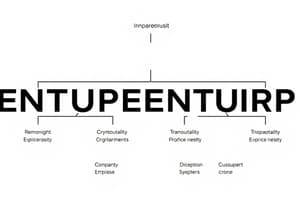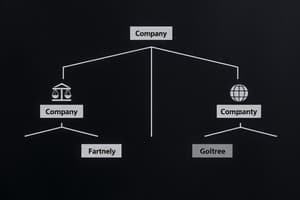Podcast
Questions and Answers
What is the main difference between a sole trader and a partnership?
What is the main difference between a sole trader and a partnership?
- The location of the business
- The type of products or services they offer
- The number of owners involved in the business (correct)
- The number of employees they can hire
What is a characteristic of a private limited company?
What is a characteristic of a private limited company?
- It is owned by the government
- It has an unlimited number of shareholders
- Its shares are not available to the public and are limited to a maximum number of shareholders (correct)
- Its shares are traded publicly on the stock exchange
What is the primary objective of a social enterprise?
What is the primary objective of a social enterprise?
- To increase market share
- To pursue social and/or environmental goals (correct)
- To maximize profits for shareholders
- To fulfill a government contract
What does the 'M' in SMART stand for in setting business objectives?
What does the 'M' in SMART stand for in setting business objectives?
What is the purpose of a mission statement?
What is the purpose of a mission statement?
What is a common objective of a private sector business?
What is a common objective of a private sector business?
What is a characteristic of a government business enterprise?
What is a characteristic of a government business enterprise?
What is the main difference between a public sector business and a private sector business?
What is the main difference between a public sector business and a private sector business?
What is the primary purpose of a values statement in a business?
What is the primary purpose of a values statement in a business?
Why is it important to regularly revisit business objectives?
Why is it important to regularly revisit business objectives?
Who are stakeholders in a business?
Who are stakeholders in a business?
What can arise due to differing interests between stakeholders?
What can arise due to differing interests between stakeholders?
How can businesses address the concerns of stakeholders regarding ethical and socially responsible operations?
How can businesses address the concerns of stakeholders regarding ethical and socially responsible operations?
What is the characteristic of an autocratic management style?
What is the characteristic of an autocratic management style?
What does the contingency approach assess in determining the appropriate management style?
What does the contingency approach assess in determining the appropriate management style?
What is the characteristic of a laissez-faire management style?
What is the characteristic of a laissez-faire management style?
Flashcards are hidden until you start studying
Study Notes
Types of Businesses and Legal Structures
- Types of business ownership and legal structures: sole traders, partnerships, private limited companies, public listed companies, social enterprises, and government business enterprises
- Sole trader: owned and operated by one individual
- Partnership: involves two or more individuals who share ownership and responsibilities
- Private limited companies: shares are not available to the public, limited to a maximum number of shareholders
- Public listed companies: shares are traded publicly on the stock exchange
- Social enterprises: pursue social and/or environmental goals
- Government business enterprises: government-owned entities operating using a corporate model to achieve commercial objectives
Business Objectives
- Common business objectives: make a profit, increase market share, improve efficiency, fulfill a market need, fulfill a social need, and meet shareholder expectations
- SMART principle in setting business objectives: Specific, Measurable, Achievable, Relevant, and Time-bound
- Vision statements: outline long-term aspirations of the business
- Mission statements: define the purpose and primary objectives of the business
- Values statement: reflects the business's shared values and cultural priorities, guiding behavior and decision-making
- Importance of revisiting business objectives regularly: ensure relevance and alignment with current market conditions and internal capabilities
Stakeholders
- Stakeholders in a business: owners, managers, employees, customers, suppliers, and the general community
- Potential conflicts between stakeholders: differing interests, such as profit maximization vs. job security, cost reduction vs. quality, and environmental impact vs. operational efficiency
- Addressing stakeholder concerns: transparent communication, ethical practices, community and environmental initiatives, and fair treatment of all stakeholders
Management Styles
- Autocratic: centralized decision-making with little input from employees
- Persuasive: manager makes decisions and persuades employees to accept them
- Consultative: manager consults employees before making decisions
- Participative: employees are actively involved in decision-making
- Laissez-faire: minimal managerial control, employees have high autonomy
- Contingency or situational management approach: assesses variables such as task nature, time frame, and employee skills to determine the appropriate management style
Studying That Suits You
Use AI to generate personalized quizzes and flashcards to suit your learning preferences.





